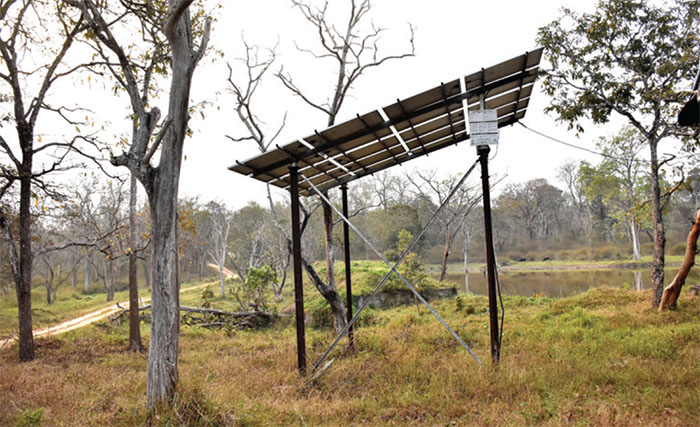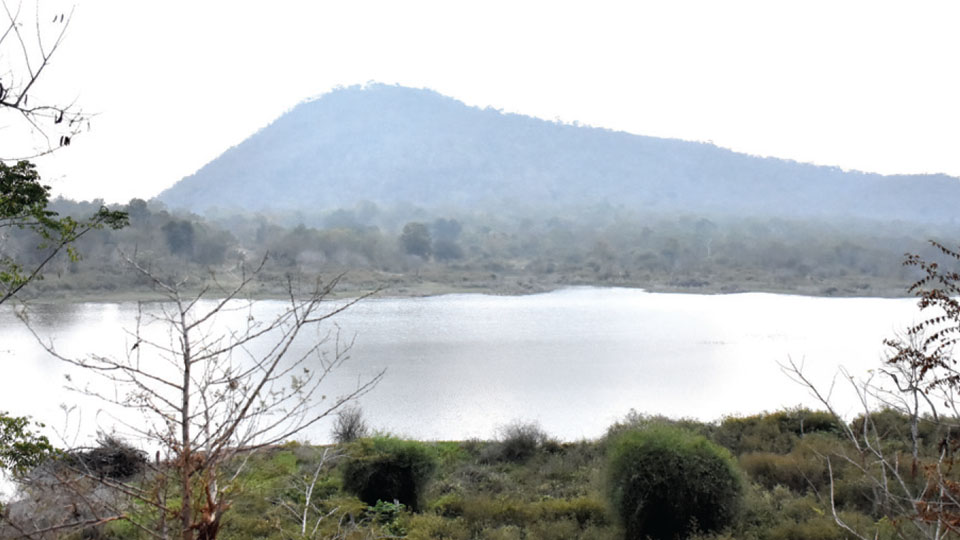By M.T. Yogesh Kumar
In the light of a rainfall deficit and persistent drought conditions, ponds, lakes and other small water bodies within the Bandipur Tiger Reserve are experiencing a notable decline in water levels, adversely affecting the resident wildlife.
To address this pressing issue, authorities have activated 57 solar borewells and water is being provided from the Mangala Dam situated within the forest area.
Over the past couple of years, insufficient rainfall in the Old Mysore region has exacerbated drought conditions, posing significant challenges to wildlife. The Bandipur Tiger Reserve, spanning Chamarajanagar and Mysuru districts, has witnessed an increased urgency in providing accessible drinking water sources for its inhabitants.
With daily temperatures soaring above the mid-30 degrees Celsius mark, the dry deciduous vegetation of the Bandipur forests has rendered them bone dry. Existing water holes, critical for wildlife survival, are expected to last only until the first or second week of March.
Solar borewells vital lifeline
Spanning over 912 sq km, Bandipur boasts 418 water holes, the majority of which are seasonal and prone to drying up as summer approaches. However, solar borewells and the Mangala Dam, steadfast water suppliers for the past three years, have emerged as vital lifelines for the Tiger Reserve’s wildlife.
Covering an expansive area of 1,036 sq.km, Bandipur Tiger Reserve was divided into 13 ranges, each equipped with solar-powered motors to operate borewells catering to wildlife needs. Recognising lakes capable of sustaining wildlife across different ranges, 57 such lakes and waterbodies were equipped with solar-powered motors years ago.
Until 2022, abundant rainfall in forested areas ensured reservoirs within the Bandipur Tiger Reserve remained replenished. The overflow from these lakes notably contributed to the Mangala Dam’s water reserves within the sanctuary. Consequently, the reliance on solar borewells diminished.

Failure of expected rainfall
However, this year, the drought backdrop has accentuated signs of water scarcity for wildlife. Anticipated rainfall in the second week of February in areas like Ooty (Udhagamandalam) in Tamil Nadu, Gudalur, Mudhumalai forests and Bandipur did not materialise, exacerbating the crisis. In response, authorities have ramped up the operation of solar borewells to mitigate the water shortage for animals.
Of the 57 solar borewells critical to wildlife in the Bandipur forests, 20 were found malfunctioning, hindering water supply efforts. Prompt action has been taken to rectify these issues, with 15 borewells already repaired and the rest slated for repair within the next two days.
These borewells powered by solar pumps have been installed in ranges that tend to suffer severe water stress like Omkar, Kundakere, Hediyala, etc. By early March, all solar borewells are expected to be fully operational, significantly alleviating water scarcity for animals during the impending summer months, Dr. P. Ramesh Kumar, Director, Bandipur Tiger Reserve told SOM.
The Mangala Dam has emerged as a vital resource for wildlife, particularly elephants, offering essential support during the dry season. While elephants typically migrate towards water bodies during summer, the presence of smaller calves complicates longer journeys.
Hence, the availability of water sources near lakes proves crucial for their survival. The Mangala Dam, with a 30-year track record of water provision, continues to attract elephants, ensuring their hydration needs are met, Dr. P. Ramesh Kumar, Director, Bandipur Tiger Reserve, told.
The area covered by the Mangala Dam, the Nugu Dam and the Kabini Dam, being frequented by elephants and other animals, ensures there won’t be a shortage of water for animals.
The proactive measures undertaken through solar borewells and the Mangala Dam signify a concerted effort to safeguard wildlife amidst challenging environmental conditions in the Bandipur Tiger Reserve.
In Nagarahole Tiger Reserve
In Nagarahole Tiger Reserve, there are 360 waterholes, with most currently holding 50 to 60 percent water levels, anticipated to last until mid-March. To further aid in addressing water stress for wildlife, authorities have installed 26 solar-powered pumps.
Interestingly, alongside solar-powered pumps, the Kabini backwater serves as a crucial water source for animals during the peak summer months. However, with water levels dwindling in reservoirs, the lakes replenished by solar-powered bore wells emerge as vital oases in the desert-like conditions for the park’s wildlife.








Recent Comments